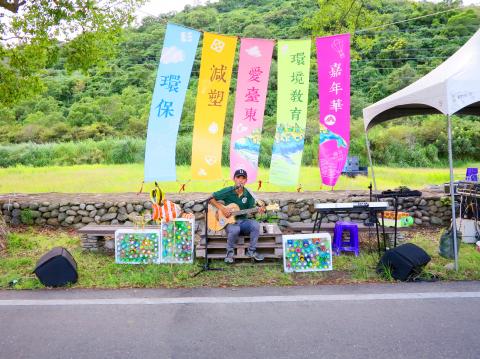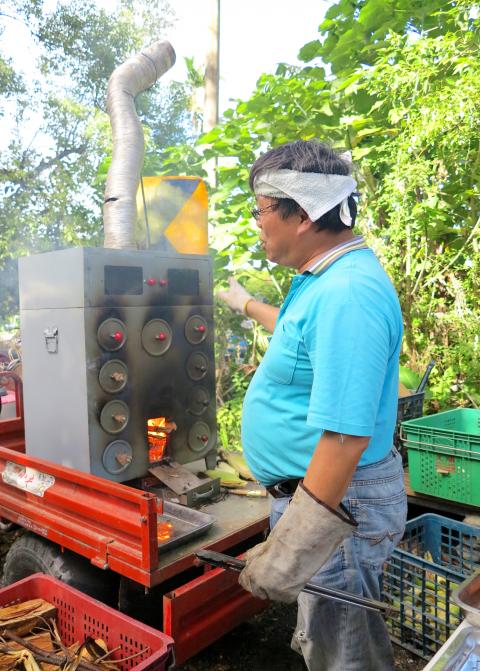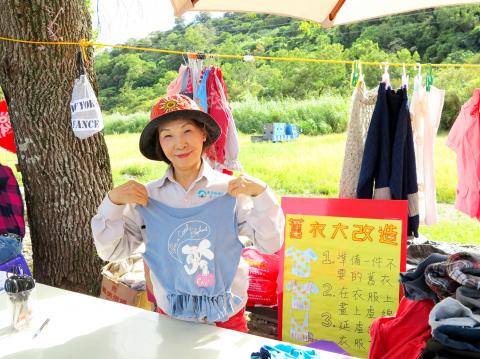The Yongan Community (永安社區) in Luye Township (鹿野鄉) is Taitung County’s version of Radiator Springs, as in the Disney animated film series Cars, minus the talking vehicles. This was once a popular tourist stopover for people traveling between Hualien and Taitung until a larger and faster highway was built to bypass it. Just as in those films, locals have rallied to revitalize their community by establishing the twice-monthly Taitung 2626 Market (台東2626市集).
Actually, the problem of exposure is not limited to Yongan. Many small farms in Taitung County produce high-quality and, often organic, products but have no way to market them. Wu Yu-Ping (吳玉萍), director-general of the Yongan Community Development Association and CEO of CACTUS Local Studio (仙人掌鄉土工作室), the two entities that manage the market, says that as this is a county-wide platform, it has been named the Taitung 2626 Market and not the Yongan or Luye 2626 Market. The numbers refer to the timing of the market, namely the second and fourth Saturdays of each month from 2pm to 6pm. In summer, during the Taiwan International Balloon Festival, which takes place at the nearby Luye Highland (鹿野高台), this becomes a weekly event.
MORE THAN A FARMER’S MARKET

Photo: Cheryl Robbins
The market is currently made up of 50 stalls. As would be expected of a farmers’ market, locally produced fruits and vegetables are in good supply. Some farms have transformed their harvests into value-added items, such as ice cream, baked goods and handmade soap. A coffee truck is on hand to call attention to locally grown coffee beans and one vendor shows off his invention, a bamboo-fueled corn griller.
Some of the stalls sell handicrafts and offer handicrafts classes, such as weaving of decorative wreaths from straw.
“Life in a farming community involves more than just growing crops,” Wu says. “In their spare time, people make handicrafts or draw or paint. We want to share the complete farming lifestyle.”

Photo: Cheryl Robbins
Wu adds that creating diversity is crucial to the success of a farmers’ market.
“It’s not enough just to focus on one aspect,” Wu says.
There is definitely no lack of diversity here. Some stalls organize games and there are live music and static display areas to showcase local talent. At one stall, ordering juice means pedaling a bicycle to create electricity for the blender, as the use of generators is not condoned. Other stalls promote various aspects of environmental conservation, with Wu noting that environmental education is a focus of this community.

Photo: Cheryl Robbins
Anyone who produces food or handmade items in Taitung County suitable for the market can apply to set up a stall. A deposit of NT$2,000 is required, but there is no rental fee. Wu says that applicants are turned away if there is already someone selling the same or similar product to prevent overlap and night market-like food stalls are not welcome.
Charitable work is another important aspect of this market. Stalls are reserved for schools or non-profit organizations to call attention to a project or to raise funds. For example, the Yongan Elementary School held a bake sale to raise money for a graduation trip around Taiwan. Other communities in Taitung are encouraged to set up booths to promote tourism or special events. In such cases, no deposit is required.
For those living in Taitung, market days are a time to see friends and have fun. Thus, there is a good mix of people, both locals and visitors, making this a great opportunity to experience Taitung hospitality.

Photo: Cheryl Robbins
REAPING THE BENEFITS
As to the benefits that this market has brought over its seven-year history, Wu says the most obvious one is economic.
“On a good day, a stall can bring in NT$20,000 to NT$30,000 in revenue,” he says. “Even on a bad day, revenue can still reach NT$2,000 to NT$3,000.”
The market has also served as a place for people to start a business. Once they have a customer base, they are able to open up their own storefront. Even more importantly, it has revitalized this area, bringing crowds of visitors and nearly 10,000 Facebook fans.
As to the future, Wu says there will be more of an effort to eliminate plastic cups from the market with shoppers encouraged to bring their own cup or to borrow a glass. Options are also being looked at to replace plastic bags with something more environmentally friendly. For example, one stall provides tote bags made from old T-shirts. In addition, shoppers can bring paper bags obtained from other purchases to be reused by market vendors.
COUNTY ROAD 33, THE WULING GREEN TUNNEL BIKEWAY
The Taitung 2626 Market and Yongan Community are located along County Road 33 (東33), also known as the Wuling Green Tunnel Bikeway (武陵綠色隧道自行車道). This fairly flat, tree-lined 4.5-kilometer-long route also passes through part of the indigenous Bunun community of Wuling and the entrance to the Wuling Prison. This is a minimum-security facility where inmates grow Arabica beans, which they also roast. They serve the coffee in a simple cafe on the prison grounds that is open to the public between 9pm and 4pm Monday to Friday. So, unfortunately, it is not possible to experience this cafe and the market on the same day. A cup of coffee is NT$50, with egg tarts and cookies also available. Visitors can also buy coffee beans to take home, as well as other products produced by the inmates such as pineapple cakes.
Ironically, there are no bicycle rental shops along this route. However, next to the market’s information desk, oBikes (bicycle sharing system in eastern Taiwan) are available. Other than that, the closest option for bicycle rentals is in Longtian Village (龍天村), which is about seven kilometers away along a very hilly route. But, this may be of interest to those looking for a challenging ride.

April 28 to May 4 During the Japanese colonial era, a city’s “first” high school typically served Japanese students, while Taiwanese attended the “second” high school. Only in Taichung was this reversed. That’s because when Taichung First High School opened its doors on May 1, 1915 to serve Taiwanese students who were previously barred from secondary education, it was the only high school in town. Former principal Hideo Azukisawa threatened to quit when the government in 1922 attempted to transfer the “first” designation to a new local high school for Japanese students, leading to this unusual situation. Prior to the Taichung First

The Ministry of Education last month proposed a nationwide ban on mobile devices in schools, aiming to curb concerns over student phone addiction. Under the revised regulation, which will take effect in August, teachers and schools will be required to collect mobile devices — including phones, laptops and wearables devices — for safekeeping during school hours, unless they are being used for educational purposes. For Chang Fong-ching (張鳳琴), the ban will have a positive impact. “It’s a good move,” says the professor in the department of

On April 17, Chinese Nationalist Party (KMT) Chairman Eric Chu (朱立倫) launched a bold campaign to revive and revitalize the KMT base by calling for an impromptu rally at the Taipei prosecutor’s offices to protest recent arrests of KMT recall campaigners over allegations of forgery and fraud involving signatures of dead voters. The protest had no time to apply for permits and was illegal, but that played into the sense of opposition grievance at alleged weaponization of the judiciary by the Democratic Progressive Party (DPP) to “annihilate” the opposition parties. Blamed for faltering recall campaigns and faced with a KMT chair

Article 2 of the Additional Articles of the Constitution of the Republic of China (中華民國憲法增修條文) stipulates that upon a vote of no confidence in the premier, the president can dissolve the legislature within 10 days. If the legislature is dissolved, a new legislative election must be held within 60 days, and the legislators’ terms will then be reckoned from that election. Two weeks ago Taipei Mayor Chiang Wan-an (蔣萬安) of the Chinese Nationalist Party (KMT) proposed that the legislature hold a vote of no confidence in the premier and dare the president to dissolve the legislature. The legislature is currently controlled